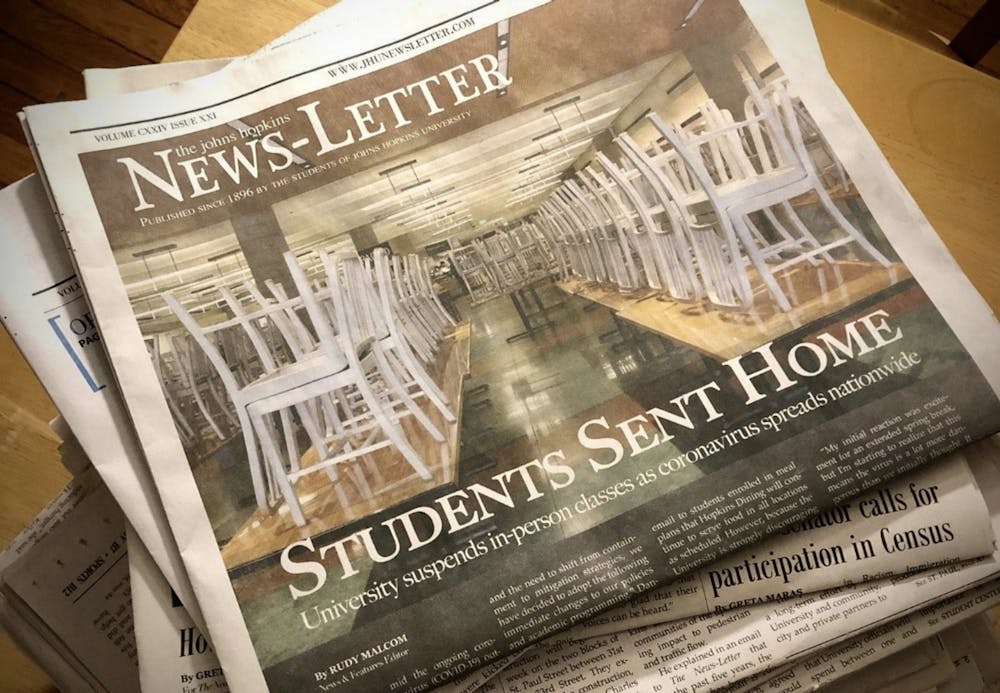Following the announcement of the suspension of in-person classes on March 10, 2020, the University announced that students were required to leave campus by March 15, 2020, due to increasing worries around the spread of COVID-19. At first, the administration expected students to return to campus on April 12, 2020, but remote classes were soon extended to the end of the year. The following fall semester, the University moved courses to an entirely virtual modality.
Since then, the University has transitioned back to fully in-person activities as of fall 2023. In interviews with The News-Letter, students discussed the challenges they faced during the pandemic, especially in regard to socialization, club spirit and academics.
Serena Chan, a research technologist at Hopkins Medicine who graduated from the University in 2022, discussed in an interview with The News-Letter how she felt the pandemic affected social interactions on campus.
“The library used to be so loud, and people used to chat a lot,” she said. “Then [in] my senior year, it was almost completely silent. I don’t want to overgeneralize, but I do feel like the kids that lost a few years in high school lost [something in terms of social interaction]. I’m a research tech — I work with some undergraduates and a few freshmen, and there’s a lot more awkward energy.”
In an interview with The News-Letter, senior Fausto Alvarez shared how he sees the effects of the pandemic on students’ interpersonal skills as temporary.
“It’s getting better with every semester,” Alvarez said. “A good indication of that is that clubs are back to their full sizes now after being really, really small. COVID conditioned us not to hang out with each other; it was like a ripple effect, and you can still see the ripples.”
In an interview with The News-Letter, President of Model United Nations (MUN) junior Lisa Boyd described the difficulties of participating in MUN virtually during the pandemic.
“Typically, we have weekly in-person trainings that are very social experiences and help the team bond, but mine were over Zoom, so I didn’t get that feel as much my freshman year,” she said. “I was in trainings with people that were on the team, but I didn’t really know them. The conferences did a really good job of adapting, but even though they were well-conducted, they were exhausting.”
Being involved with the Filipino Students Association and JHU Humming Jay during her time at Hopkins, Chan realized the effects of desocialization within her organizations when comparing her freshman and senior year. She stated that during her freshman year, students were invested in their student organizations as well as their academics, but during her senior year, she found it was harder to retain members and encourage student contributions.
Chan suggested that as the pandemic shut down high school social activities and caused uncertainty around academics, students felt increasing levels of stress and cited it as a reason for decreased participation in student organizations.
Senior Lance Large, an athlete on the football team at the University, discussed the impact of the pandemic in an email to The News-Letter. After the cancellation of his sophomore season and being unable to train on campus, Large found it difficult to build relationships with the team.
“I felt disconnected to all of my teammates and felt like I could not form a connection,” he wrote. “I was stressed to leave my apartment and also stressed that if an outbreak occurred among the football team it would create a negative perception of the team.”
As well as affecting campus culture, the pandemic altered the delivery of education as the University made the shift to virtual learning.
Elena Botts, a graduate student at the School of Advanced International Studies, filed a lawsuit against the University in May 2022 after the transition to remote learning in 2020.
In an email to The News-Letter, Botts argued that the University failed to provide the agreed-upon level of education and academic rigor during the pandemic.
“The online curriculum contributed to the overall lack of engagement that SAIS offered,” Botts wrote. “The administration failed to support any form of accommodation requests and treated me transactionally. Hopkins as an institution was not interested in supporting me and offered no real community or opportunity for my needs.”
In an email to The News-Letter, Assistant Vice President for Media Relations and News J.B. Bird responded to the settlement.
“We are very confident in the quality of the education and services we provided to our students throughout the pandemic, including through a variety of financial, academic, and other supports,” he wrote. “We do not agree with the merits of this suit, but we are pleased to see it resolved.”
Boyd acknowledged that though the transition was difficult, MUN adapted to the pandemic to learn how to be social in a partially virtual environment.
“We've grown as a club having had these two years where we've had to overcome so much,” she said. “It was during that period where the club did some of its biggest [growth], and we were able to become more competitive. That pushed us to learn how to reach people online, and our team is such a big social culture now, like a family on campus.”





